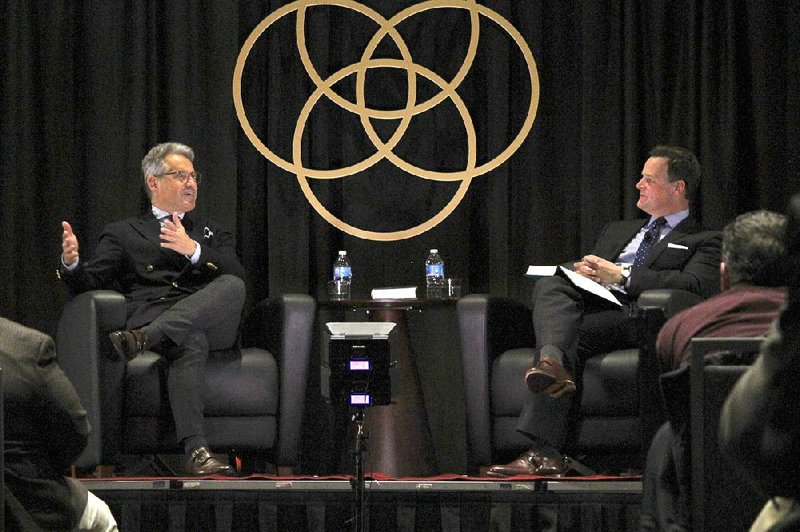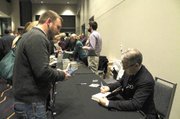Author and radio show host Eric Metaxas never had plans to write a book about Martin Luther, he told a sold-out audience of around 500 on Tuesday night at the Robinson Center Performance Hall in Little Rock.
Metaxas was the first guest speaker at "City Center Conversations: Conversations About God, Life and Faith in the City," an event hosted by Steven Smith, senior pastor of Immanuel Baptist Church in Little Rock. The church sought to model the series after another that Metaxas created and hosts called "Socrates in the City: Conversations on Life, God and Other Small Topics."
Metaxas, whose works include biographies on theologian and spy Dietrich Bonhoeffer and abolitionist Wilbur Wilberforce, said his friend Greg Thornbury, president of The King's College in New York, caught him off guard when he first asked him to write a book about the man who started the Protestant Reformation in light of the Reformation's 500th anniversary.
"I actually said, 'What do you mean, the 500th anniversary's coming up?'" Metaxas said he'd replied.
It was in response to Thornbury's persistence that Metaxas began to research Luther on his own and found the historical figure to be not only a "wildly entertaining" person but "the most influential figure, apart from Jesus, in 2000 years of history." He then began work on the book that would become Martin Luther: The Man Who Rediscovered God and Changed the World.
Metaxas said he was raised by a Greek father and a German mother -- "and if your dad's Greek and your mom's German you're raised Greek," he said to laughter from the audience -- and was raised in the Greek Orthodox church.
"I was an altar boy, but I never got the down-low. I never got, 'Is this true?'" said Metaxas, who said he had experienced church as a "cultural nicety."
As a student at Yale University, Metaxas was trained to avoid born-again Christians but kept questioning his views until he had a dream that changed his life "literally overnight," helping to lead him to his wife, Susanne, and his life today.
According to Metaxas, the story of Luther has no beginning, in part because the exact year of his birth is unknown, but also because of a strange set of coincidences he found while learning more about Luther.
Luther's birth was mentioned in passing as falling on St. Martin's Day in the biographies Metaxas had read, without explaining who St. Martin was.
It was only after some digging, Metaxas said, that he found out that St. Martin had lived in the fourth century and is known for one event: having taken a stand against the Roman army and refusing to kill others as a result of his Christian faith, similar to how Luther would later face the Catholic Church during his heresy trial at the Diet of Worms in 1521 and refuse to change his views, resulting in excommunication from the church.
St. Martin took his stand in Borbetomagus, Metaxas found, the town that would eventually be known as Worms, Germany.
"To think that the man after whom Luther was named [11] centuries before in the same obscure spot took a very similar stand ... you have to at least think a little bit that God is a god of history, that somehow, in some divine economy, God foreordained some of these things," Metaxas said. "So that's why I say [Luther] has no beginning, because it's as if the whole thing began [17] centuries ago."
Metaxas said he never set out to debunk ideas about Luther's life, but nevertheless several of them -- including the idea that Luther's wife, Katharina von Bora, hid in a barrel to escape the monastery where she had been a nun -- could not be substantiated.
Luther's "95 Theses" had been not directives but debate points for the Catholic Church, Metaxas said, and church doors were also used as bulletin boards. Luther didn't set out to change the world when he affixed "95 Theses" to the doors of Wittenberg Castle Church, but to start a conversation.
"He was as pro-Catholic as you can get," Metaxas said. "He was a man who loved his church, loved the pope. ... He never, never wanted to start a new church or destroy the church. He was only trying to help the church be the church. And of course it didn't go the way he hoped, and it took some time for him to be pushed to where suddenly he finds himself leading another movement, but he never wanted to do that."
"[Luther] so feared God, in a good way, that he didn't fear man," Metaxas said. "I think that's the lesson to all of us -- that if you know God is real, you're not going to fear what people will think or what people will do."
In discussing Socrates in the City, Metaxas affirmed that "good things are meant to be stolen," saying he was thrilled that the series format of his event was, in Smith's words, being "sort of hijacked" in Little Rock.
Metaxas first had the idea for Socrates in the City in 2000. He said he thought the series would help people think about the big questions and drew from the Socrates quote "the unexamined life is not worth living."
"I thought, that's a perfect way to get people to think," Metaxas said. "In New York City, where most people don't examine their lives, they're running after the brass ring or whatever it is, what if we pause and have an event like this where we talk about the big questions? ... To have conversations of some import, but also to have some fun.
"I thought that we should talk about these very important things, but that we should enjoy it. You don't have to agree, but let's chew the fat."
Afterward, Smith announced to a crowd that proceeds from the event were being donated to Hope Rises, an organization that helps women in prison or newly released transition back into the world. Tracey Grant, program coordinator for Hope Rises, accepted the donation.
Lee Strobel, author of The Case for Christ, will be the next guest for City Conversations on Feb. 20 in Little Rock.
Religion on 12/16/2017


